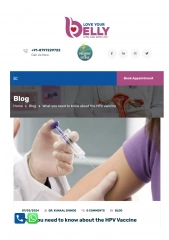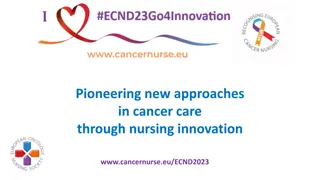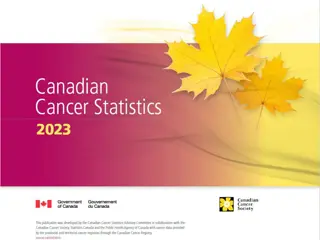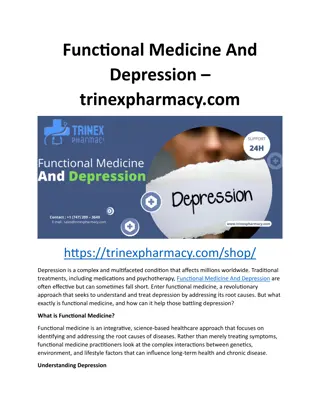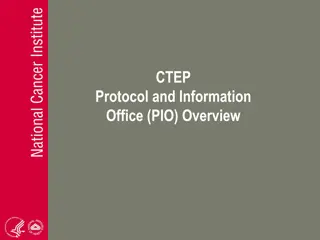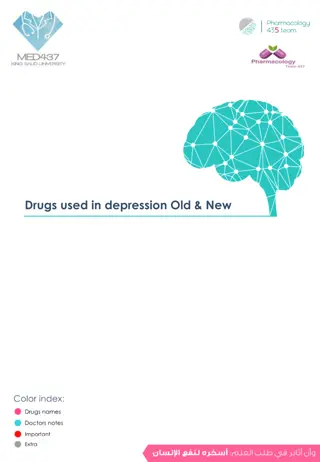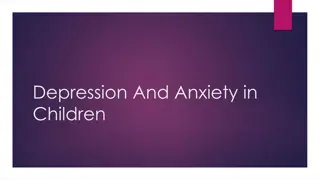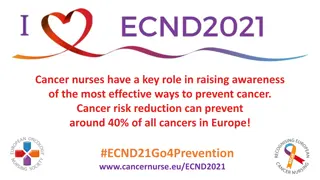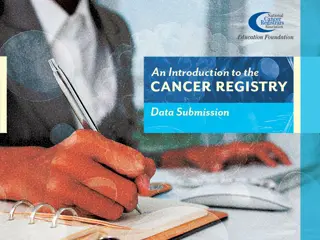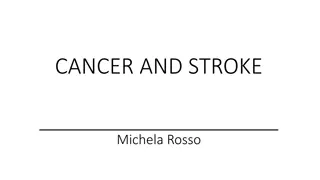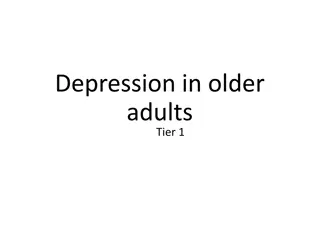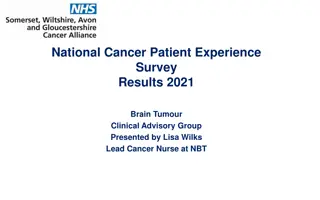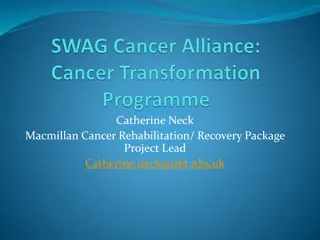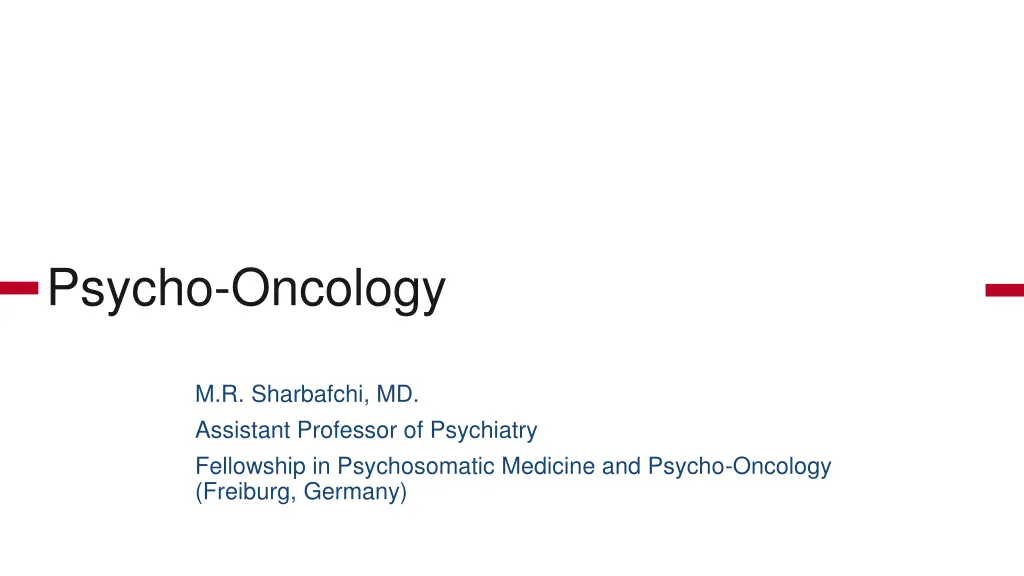
Understanding Psycho-Oncology in Cancer Patients
Explore the realm of psycho-oncology in cancer care, focusing on the mental well-being of patients. Delve into the impact of psychiatric disorders, common symptoms, and the rationale for a holistic model of care. Discover insights on palliative care, cancer epidemiology, and the need for psychosocial support in cancer treatment.
Download Presentation

Please find below an Image/Link to download the presentation.
The content on the website is provided AS IS for your information and personal use only. It may not be sold, licensed, or shared on other websites without obtaining consent from the author. If you encounter any issues during the download, it is possible that the publisher has removed the file from their server.
You are allowed to download the files provided on this website for personal or commercial use, subject to the condition that they are used lawfully. All files are the property of their respective owners.
The content on the website is provided AS IS for your information and personal use only. It may not be sold, licensed, or shared on other websites without obtaining consent from the author.
E N D
Presentation Transcript
Psycho-Oncology M.R. Sharbafchi, MD. Assistant Professor of Psychiatry Fellowship in Psychosomatic Medicine and Psycho-Oncology (Freiburg, Germany)
Cancer Epidemiology Age-standardized incidence rate (ASR) 142 per 100,000 in Iranian population 127.7 154.8 Sharbafchi@med.mui.ac.ir Estimation of 100-110,000 new cases per year M. Sharbafchi, M.D. Isfahan University of Medical Sciences World Health Organization. Regional Office for the Eastern Mediterranean. Eastern Mediterranean Region: framework for health information systems and core indicators for monitoring health situation and health system performance 2018 .
Cancer Epidemiology Iran Cancer Population 900,000 Sharbafchi@med.mui.ac.ir Death Advanced disease (End of life care) 52,000/Year New Cases 110,000/Year 56,000/Year M. Sharbafchi, M.D. Isfahan University of Medical Sciences
Palliative Care Sharbafchi@med.mui.ac.ir M. Sharbafchi, M.D. Isfahan University of Medical Sciences
Rationale for Developing a Psycho-Oncology Model of Care Death Dependency Disfigurement Disability and abandonment Sharbafchi@med.mui.ac.ir Disruptions in relationships Disruptions in role functioning Disruptions in financial status M. Sharbafchi, M.D. Isfahan University of Medical Sciences
Common Symptom (Comprehensive-2017) Fatigue Worry Sadness Pain Drowsiness Dry Mouth Insomnia Poor appetite Nausea Bloating Difficulty in concentration Change in taste Constipation Cough Sexual dysfunction Nightmare % Positive 74 71 66 63 61 56 54 45 44 39 38 36 33 30 24 11 Psychiatric Patients Disorders in Cancer Sharbafchi@med.mui.ac.ir M. Sharbafchi, M.D. Isfahan University of Medical Sciences
Psychiatric Disorders in Cancer Patients Long term distress: 66% Adjustment disorders: 30 -35% Clinically significant anxiety disorder: 30% Major Depression: 20-35% Sharbafchi@med.mui.ac.ir Delirium: 10% Treatable syndromes, such as major depression and delirium, continue to be underdiagnosed and undertreated M. Sharbafchi, M.D. Isfahan University of Medical Sciences Clinical Practice Guidelines for the Psychosocial Care of Adults with Cancer (2003)
SUICIDE The relative risk of suicide in this population is twice that of the general population More likely to occur in Advanced cancer patients Depression Hopelessness Poorly controlled symptoms particularly pain Older patients Mail gender Sharbafchi@med.mui.ac.ir Suicidal thoughts in patients with advanced disease, poor prognosis, or poorly controlled symptoms should not be viewed as rational M. Sharbafchi, M.D. Isfahan University of Medical Sciences
SUICIDE High risk Cancers: Head and neck Lung Breast Urogenital GI cancers Myeloma Sharbafchi@med.mui.ac.ir Unmarried men with head and neck cancers: the highest incidence of suicide. Half of the patients were in remission at the time of suicide M. Sharbafchi, M.D. Isfahan University of Medical Sciences
SUICIDE Maintaining: Supportive relationship Symptom control (e.g., pain, nausea, depression) Sharbafchi@med.mui.ac.ir Involving the family or friends are the initial steps in management of a suicidal patient M. Sharbafchi, M.D. Isfahan University of Medical Sciences
Cancer-related fatigue Persistent subjective sense of tiredness related to cancer/treatment that interferes with usual functioning. Cancer-related fatigue is usually refractory to sleep and rest Present at the time of diagnosis in about 50 percent of cancer patients. Sharbafchi@med.mui.ac.ir Occurs in up to 75 percent of patients with bone metastases. Prevalent in long-term cancer survivors and has a serious impact on a person's quality of life. M. Sharbafchi, M.D. Isfahan University of Medical Sciences
Delayed Consequences of Treatment Infertility problems, premature ovarian failure Pituitary, thyroid and other endocrine failures Increased vulnerability to large organ failure and secondary malignancies Sharbafchi@med.mui.ac.ir Social rejection, employment discrimination, and serious financial problems M. Sharbafchi, M.D. Isfahan University of Medical Sciences
Three Phases of Response to Knowing of Cancer First phase Shock and Disbelief that usually lasts less than 1 week. Try to control the level of emotional distress while making crucial treatment decisions Sharbafchi@med.mui.ac.ir Presence of a relative or friend can help with the processing of important information. The way the news is conveyed can influence a patient's beliefs, emotions, and attitudes toward the future and the medical staff. M. Sharbafchi, M.D. Isfahan University of Medical Sciences
Three Phases of Response to Knowing of Cancer Second phase Characterized by a period of confusion with mixed symptoms of: Anxiety Depression Irritability Insomnia Poor concentration Inability to function Sharbafchi@med.mui.ac.ir Resolve with support from family and friends and from the physician who outlines a treatment plan that offers hope. This phase usually lasts 1 to 2 weeks M. Sharbafchi, M.D. Isfahan University of Medical Sciences
Three Phases of Response to Knowing of Cancer Third phase The patient adapts to the diagnosis and treatment. The patient returns to previously used coping strategies that are helpful in reducing stress. Sharbafchi@med.mui.ac.ir These coping strategies are influenced by the previous level of maturation and adaptation. M. Sharbafchi, M.D. Isfahan University of Medical Sciences
End-of-Life and Palliative Care Death from a chronic illness makes the sufferer and his or her loved ones live in the presence of death for a prolonged period. Some elderly people accept death, but many elderly patients find death premature. and many families wish desperately to extend the life of a beloved parent. Sharbafchi@med.mui.ac.ir With cancer, sufferer loses more and more of the roles that defined his or her social existence before dying a physical death. (Social death) M. Sharbafchi, M.D. Isfahan University of Medical Sciences
Symptoms in Patients with Advanced Disease Dying patients experience more symptoms than they can describe and more than their caregivers are likely to explore. Nervousness, sadness, insomnia, fear of dependence, or loss of dignity, are among the most prevalent. Sharbafchi@med.mui.ac.ir Physical, psychological, and existential concerns cannot be considered independently of one another. M. Sharbafchi, M.D. Isfahan University of Medical Sciences
Symptoms in Patients with Advanced Disease Kubler-Ross Interviews with 400 dying patients revealed that patients know without being told that they are dying They need to talk about it, and that they need to maintain hope, even if there is no hope of cure. Sharbafchi@med.mui.ac.ir Fatal illness is not a sudden event and practitioners can provide support to patients by assuring them that they will maintain their relationship with them during the dying process M. Sharbafchi, M.D. Isfahan University of Medical Sciences
Stages from Awareness of Fatal Prognosis to Actual Death Denial. "No, not me" is the dying patient's common initial response. If it does not interfere with treatment, then denial can mitigate the initial overwhelming anxiety. Anger. "Why me?" Indignation may surface when denial subsides. Patients are irritable, demanding and critical; anger may be directed at themselves, caretakers, family and friends or Sharbafchi@med.mui.ac.ir God. Bargaining. "Yes me, but .... , This stage entails promises to buy additional time. The patient may promise to donate kidneys or eyes to research or reaffirm an earlier faith in God. M. Sharbafchi, M.D. Isfahan University of Medical Sciences
Stages from Awareness of Fatal Prognosis to Actual Death Depression. "Yes, me." The patient comes to a full realization of what is going to happen and to whom. With the impending loss of life, a pervasive despondency may set in. Acceptance. The patient begins to accept the inevitable. It need not be defeat or total surrender. Sharbafchi@med.mui.ac.ir "Yes, me, and I'm ready." M. Sharbafchi, M.D. Isfahan University of Medical Sciences
Symptoms in Patients with Advanced Disease These five stages are not all-encompassing or prescriptive. Patients do not travel these stages in a linear fashion. A patient may demonstrate aspects of all five stages in one interview, fluctuate or come to them in differing orders. Sharbafchi@med.mui.ac.ir Few will reach acceptance. Moreover, patients may exhibit other coping methods, such as terror, humor or compassion to offset each stage. M. Sharbafchi, M.D. Isfahan University of Medical Sciences
Factors in Adaptation to Cancer The Society-derived Factors Society's attitudes toward cancer and its treatment Perceptions and knowledge of cancer at a given time Less threatening and stigmatized Sharbafchi@med.mui.ac.ir The belief that stress, depression, major life events (grief, ), or flaws in personality cause cancer. During the past 10 years, more than 15 reviews of psychosocial risk factors for cancer have been published The majority of well-designed studies do not confirm that depression, stress, personality, and major life events cause cancer. M. Sharbafchi, M.D. Isfahan University of Medical Sciences
Factors in Adaptation to Cancer The Patient-derived Factors Positive Intrapersonal factors: Preexisting character style Coping ability (Active and problem-solving, emotional, Meaning based) Ego strength Sharbafchi@med.mui.ac.ir Hopefulness Impact and meaning of the cancer Identification with who are seen to be improving/de-identification with who are not doing well in their cancer treatment M. Sharbafchi, M.D. Isfahan University of Medical Sciences
Factors in Adaptation to Cancer The Patient-derived Factors Negative Intrapersonal factors: Younger age Coping strategies which include avoidance of emotions and stressors Sharbafchi@med.mui.ac.ir Desire to maintain a high degree of control Experience loss of hopefulness (often related to clinical uncertainty) Experience restriction in access to social and leisure activities M. Sharbafchi, M.D. Isfahan University of Medical Sciences
Factors in Adaptation to Cancer The Patient-derived Factors Interpersonal factors: Social support derived from others Socioeconomic and social class: Sharbafchi@med.mui.ac.ir Lower socioeconomic status can be a barrier to access health care M. Sharbafchi, M.D. Isfahan University of Medical Sciences
Factors in Adaptation to Cancer The Cancer-derived Factors Stage of the disease Symptoms Site Sharbafchi@med.mui.ac.ir Prognosis Type of treatment Impact in functionality M. Sharbafchi, M.D. Isfahan University of Medical Sciences
Psychosocial Needs to Patients and Families Understanding of illness, Treatments and Services What is going on? What should I do now? Coping with emotions surrounding illness and treatment Depression, Anxiety, Anger Sharbafchi@med.mui.ac.ir Managing illness and health How to cope with treatment side effects, How to feel well, M. Sharbafchi, M.D. Isfahan University of Medical Sciences
Psychosocial Needs to Patients and Families Behavioral change to minimize disease impact Behavioral/health promotion interventions such as smoking cessation assistance, patient education etc. Managing disruptions in work, school and family life Family and caregiver education, assistance with Activities of Daily Living. Sharbafchi@med.mui.ac.ir Financial assistance Financial planning, eligibility and assistance with applications for disability pension, etc. M. Sharbafchi, M.D. Isfahan University of Medical Sciences

